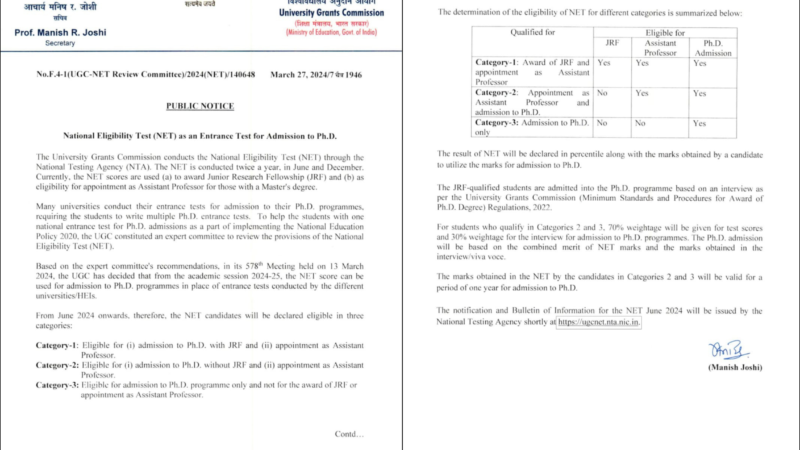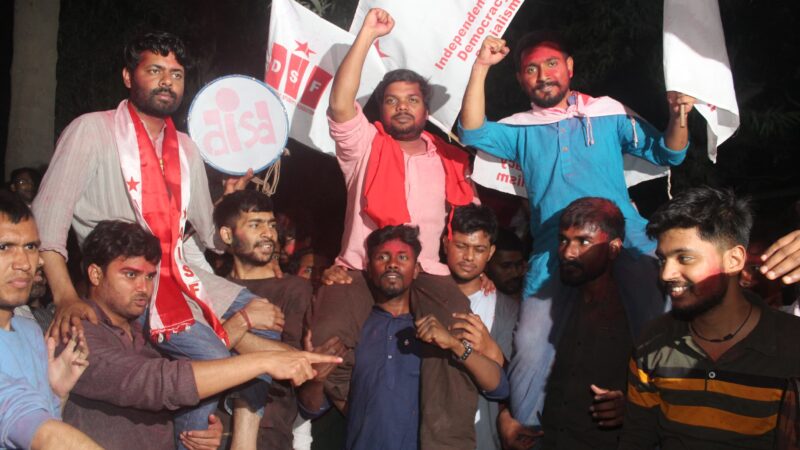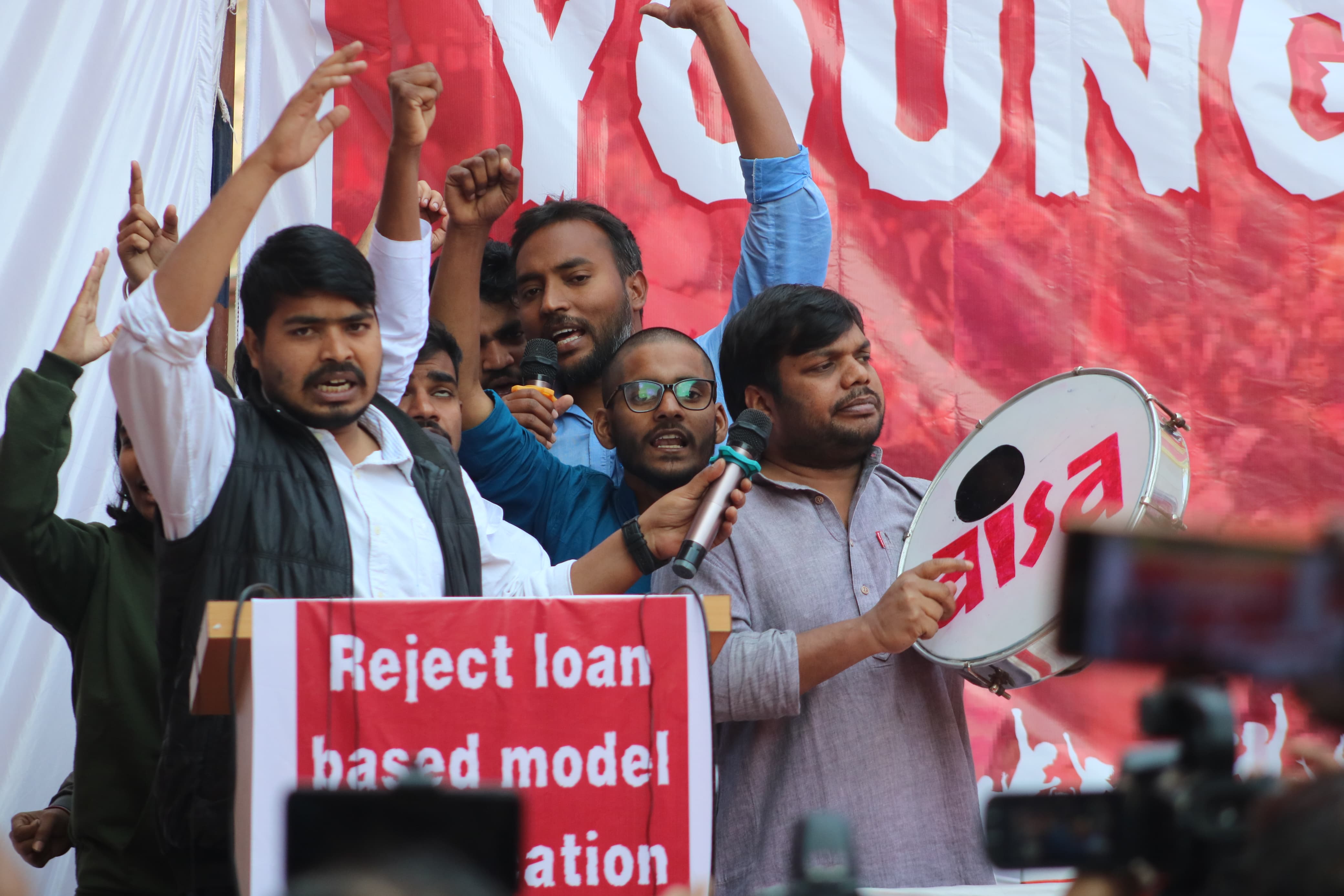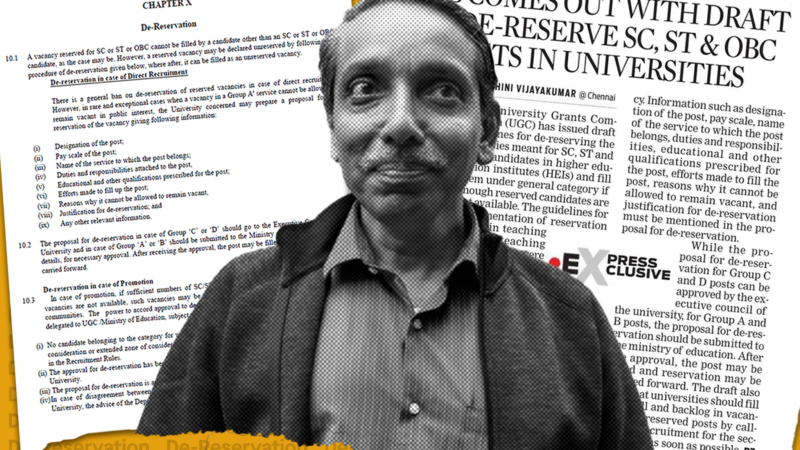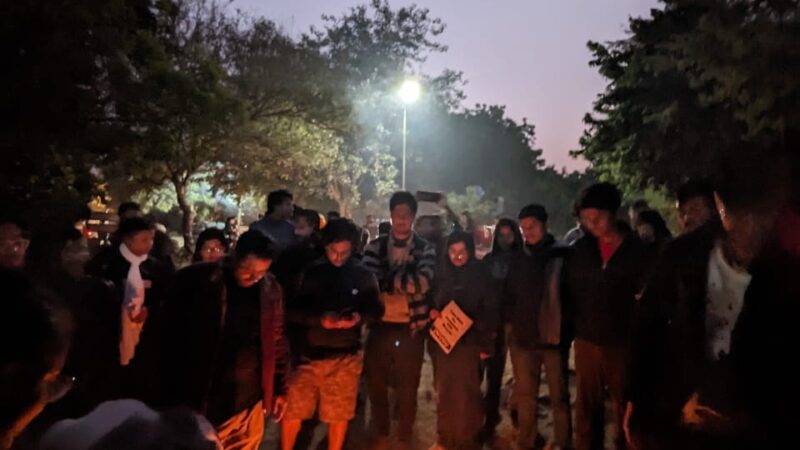NEP 2020: A Policy of Exclusion from Education
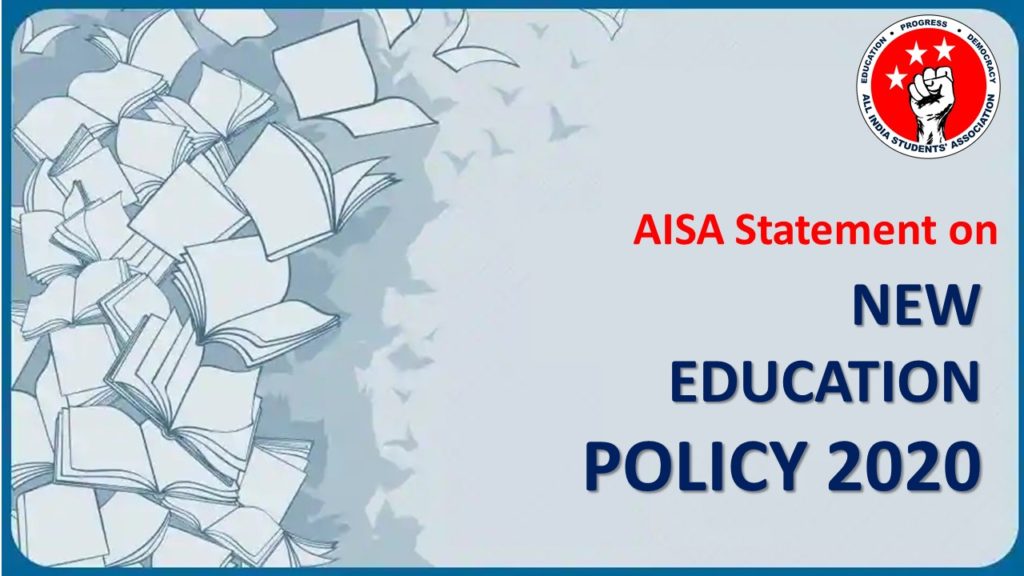
Promotion of Graded Inequality in the name of 4 year Multiple Entry/Exit Degree Programme!
Academic Homogeneity, Regulation of Ideas and Financial Freedom to Exploit the Crux of New Education Policy!
Pandemic crisis turned into opportunity to push for privatization in education!
The Cabinet approved the Draft New Education Policy yesterday. While the government claims that it is aimed at increasing access to and equity in education, the closer understanding of the details reveal otherwise. The approved NEP will further systemize the marginalisation of the socially and economically marginalised sections of the society.
The underlying principle of National Education Policy (NEP) 2020 is about Prime Minister’s touted slogan “Aatmanirbhar” i.e. self-reliance. The aims, objectives and principles present a picture of duty-based approach rather than rights based approach. This means the government backing away from ensuring education to giving the private sector the power and duty to control ideas.
However, much touted unique selling point celebrated as a paradigm shift by NEP i.e. the multiple exit point degree in higher education is nothing but a promotion of graded inequality. This policy will further marginalize and eliminate the poor and the vulnerable from the education sphere, with the privilege only getting an opportunity to complete the degree. Similarly, the policy also regulates the ideas through academic homogeneity i.e. central control on common exams and administration but on the other hand give financial freedom to both public and private institutions to exploit the people.
The principle of NEP is the promotion of private institutions with euphemistic words like Public-Private- Philanthropy partnership at both school and higher education. This means NEP does not hold the private players and the government accountable to ensure social justice. In spite of long standing demand from student movement of the country, the NEP does not even mention the need to enforce constitutionally mandated reservation and policies of affirmative actions in private educational institutions.
NEP is also an attack on the federal structure of constitution as education is on the concurrent list and demands consultation and coordination, but not uniform implementation. Similarly, the draft promotes policies of digital exclusion like online education and use of technology for teaching and learning, but fails to guarantee on how it will expand the access and affordability of this technology for students.
NEP clearly steers away from governments’ responsibility about funding despite claiming it will increase governments’ expenditure on education to 6% without actually committing on how it will do. The burden of investment and expenditure is on the private players and individuals through “Private- Philanthropy” partnership, which is nothing but a euphemism for corporate takeover of both school and higher education.
Government abdicates it responsibility to regulate education sector by promoting self-regulation at both school and higher education level for private players. NEP prescribes closure of small schools and colleges in favor of larger schools and universities, which is nothing but destroying public funded education.
School Education:
The NEP changes the existing 10+2 structure in school education with “a new pedagogical and curricular restructuring” to 5+3+3+4 covering ages 3-18. NEP argues that the present 10+2 structure doesn’t cater to children of 3-6 age group as formal education begins at Class 1 begins at age 6. Hence the new 5+3+3+4 structure, will provide Early Childhood Care and Education (ECCE) from age 3.
The responsibility of ECCE is with Anganwadi centers. Anganwadi workers/teachers will trained, give high quality infrastructure, play equipment and good infrastructure. It is even said that “Anganwadi workers/teachers with qualifications of 10+2 and above shall be given a 6-month certificate programme in ECCE; and those with lower educational qualifications shall be given a one-year diploma programme”. The use of DTH channels and use of smartphones for digital/distance is argued for ensuring education for children.
However, the document fails to guarantee a permanent job rather than a contract, honorarium based work which is presently done by them. Forget about the permanent job, no minimum wage is guaranteed. On the digital divide question, the document doesn’t speak how it will increase the digital access to people who don’t have access to TV, continuous electricity, internet, smart phone or gadgets. Considering Internet penetration is only 40% nationally with rural areas further marginalized.
NEP argues “trained volunteers – from both the local community and beyond –“, and alumni for “one-on-one peer tutoring” for extra-help sessions, career guidance, mentoring students and other learning related issues under “the supervision of trained teachers and by taking due care of safety aspects”, only means the abdication of responsibility to teach and ensure learning by government. The government walking away from public education or its responsibility to provide quality and affordable teaching can’t be celebrated
Evasion of Government’s Responsibility: Replacing the word private, the NEP bring Philanthropy and is talking of Public-Philanthropy partnership through which Modi government intends to brush any responsibility it had to ensure infrastructure and is willing to place school education at the goodwill of few people with money. This is nothing but giving school education in the hands of corporate sectors and private individuals.
Supremacy of Sanskrit over other classical languages: Over emphasis on Sanskrit promotion over other languages shows the renewed intention of Modi government to push Sanskrit. Though the document speaks of other languages but the over emphasis on Sanskrit shows the priorities of the government. Similarly the government’s focus on India’s Ancient knowledge system and practices seems to ignore and reject other practices that have been evolved later on in different phases of country.
“Wherever possible, the medium of instruction until at least Grade 5, but preferably till Grade 8 and beyond, will be the home language/mother tongue/local language/regional language”. This is a systematic change in medium of education and raises questions on availability of teachers, quality of education material and also how this will be implemented. Making this compulsory for both public and private devoid students an opportunity to learn in the medium they want.
Closure of Government Schools: The NEP 2020 promotes closure of government schools “judiciously” in the name of grouping structure called School Complexes. The low enrolment ratio and economies of scale are being shown as reason for school closure. The reality of low enrolment ratio in government schools is because of active promotion of private schools at the cost of quality in government schools and also lack of public investment in teaching, learning and infrastructure issues concerning school education. Rather than correcting the flawed policy, the NEP 2020 promotes destruction of government schools.
Freedom to exploit for Private Schools: NEP proposes self-regulation or accreditation system for all stages of education including pre-school education – private, public, and philanthropic – to ensure compliance with essential quality standards. An independent, State-wide, body called the State School Standards Authority (SSSA) will be set up. This is nothing but government saying a farewell to ensuring quality and leaving it on private players just like it has done in other fields of economy.
Higher Education:
Homogenization and Centralization of Academic Freedom: Centralization of conducting of examinations by National Testing Agency (NTA) for all universities, colleges and institutes though sounds ideal but denies autonomy to universities and places colleges/universities under a system of hierarchy. However, NEP talks of reducing the burden, the case of NEET and other all India exams centralized and conducted by NTA and other agencies will bring a new set of problems.
Closure of Public Funded Universities and Colleges: NEP just like the school education prescribes formation of large multidisciplinary universities, colleges and HEI clusters/ knowledge hubs each with aim of having 3000 or more students. This categorically means closing down of small or medium government funded universities/ colleges or institutes in favor of large multidisciplinary universities. Most atrociously, the document uses reference to Nalanda and Taksashila to justify its ill-intentioned logic of closing down colleges to build up large universities.
Privatisation and closure of Public Funding in the name of Restructuring: These Higher Education Institutes (HEI’s) will be governed by Higher Education Commission of India (HECI). Under HECI there will be various pillars concerning each issue of HEI’s that will be part of structure. National Higher Education Regulatory Council (NHERC) single point regulator for the higher education sector including teacher education and excluding medical and legal education. The second vertical will be ‘meta-accrediting body’, called the National Accreditation Council (NAC) for accreditation. The third will be the Higher Education Grants Council (HEGC), to carry out funding. The fourth vertical will be the General Education Council (GEC) for academic standard setting. This technically means dismantling of existing bodies like UGC and others henceforth changing the dynamics and power relations of governance.
These HEI’s will headed by the Board of Governors (BoG). The BoG will have the authority to decide on fees, making appointments including the head of HEI’s and taking decisions regarding governance This model of governance will centralize and destroy autonomy and academic excellence.
A National Research Fund will be established to coordinate the funding of research by various government agencies like such as Department of Science and Technology (DST), Department of Atomic Energy (DAE), Department of Bio-Technology (DBT), Indian Council of Agriculture Research (ICAR), Indian Council of Medical Research (ICMR), Indian Council of Historical Research (ICHR), and University Grants Commission (UGC). This coordination is nothing but controlling the autonomous funding regime that exists into a centralized model.
The NEP also states that there would be no difference between private and public institutions, which signals to a massive withdrawal of the govt from funding public institutes. Meanwhile, an Autonomous degree-granting College (AC) will refer to a large multidisciplinary institution of higher learning that grants undergraduate degrees and is primarily focused on undergraduate teaching though it would not be restricted to that and it need not be restricted to that and it would generally be smaller than a typical university.
No Recognition of Social Discrimination within Education, No Commitment for Social Justice: It is under the same BJP government that the country saw a massive upsurge against Rohith Vemula’s Institutional Murder. Institutional Discrimination of students from marginalized communities, casteism and communalism in action in higher education as well as systematic push out of students from students from marginalized communities was brought to the fore through the Justice for Rohith movement. The NEP 2020 fails to recognize the existence of discrimination in Indian education system despite the fact that several such instances have come to light. It only sees the issue as a question of adjustment for the underprivileged students.
Graded Inequality and Forcing Dropouts: The 4-year multidisciplinary Bachelor’s programme from the NEP will be a disaster as we have seen in Delhi University with the FYUP system. Which was not only resisted by students and teachers but also ultimately had to be withdrawn by the administration for failing to impart education and learning. Multiple entry/exit in higher education essentially means that only students with good financial condition will be able to complete their degree. The poorer Students will have to settle for a diploma.
Also, certificate in one year, diploma in 2 years, bachelors in 3 years are basically going to be devalued degrees as anyone forced to take these degrees will be treated as dropouts. If these courses are not separate, and only part of a larger 4 year module, people are actually going to know less than they do now with these degrees.
A Policy to Promote and Fund Private Universities: The NEP 2020 time and again mentions the ‘importance’ of private investment and philanthropy in education. It is not only a clear call for private and philanthropic enterprises to expand their business in Higher Education, it also promises government help for these HEI’s. We all know who this philanthropist HEI’s will be. This is nothing but a euphemism for corporate and private control of higher education.
Firstly, the policy promises lesser regulation for opening new Higher Educational Institute. While on the one hand, in the name of accreditation and standard, the NEP is a design of shutting down public funded universities, on the other it promises not to care for quality and standard in opening new universities. More over by encouraging a progressive regime of fees determination, the NEP is clearly setting a module for fee hikes and exclusion in higher education.
Enforcing Fee hike and Self Financing in the name Autonomy: Colleges and universities will have graded autonomy. Accreditation ratings will decide the degree of autonomy of an institute. So an institute with much higher accreditation can increase its fees, thereby excluding the poor and marginalized from quality education as the universities are certain to begin new self-financing courses to generate funds themselves. This has been in works for quite some time now, the liquidation of UGC and sanctioning of HEFA loans in place of grants had already been materialised.
Freedom to exploit for Private Universities: Self-regulation system will govern the private universities where the institutes have to give self-declaration on the quality of teaching, learning, infrastructure, fees and other details. Therefore, ending the role of regulation of government. This will lead to disastrous outcomes in higher education with no frills approach for private players to increase fees and exclude the poor and marginalised from education.
Forcing Digital Divide and Exclusion in the name of Online Education: There has been emphasis on starting online education in top 100 universities. This is nothing but a policy to exclude the marginalized from education system. The policy doesn’t talk on how it will increase internet penetration, reduce the digital divide and ensure access, affordability and quality of education is ensured. Similarly, the stress on distance education goes against the idea of education.
The NEP talks of creating an autonomous body, the National Educational Technology Forum (NETF), to provide a “enhance learning, assessment, planning, administration, and so on, both for school and higher education”. However the policy doesn’t talk how it is going to end the digital divide. How it is going to increase the affordability and accessibility of digital gadgets required for such education. It doesn’t specify anything on the funding regime indicating it will be pushed on the students and giving way for privatization.
Eliminating MPhil and reducing the duration of MA in the integrated programme only shows the lack of understanding Modi government has towards research. MPhil is the training ground and has its significance in enhancing research. By removing MPhil, the government has indicated its stance of reducing funding and support to research in India.
The new policy about the “teaching path” basically means (even though it gives a scope to design better courses and be a better teacher) teachers can take basic classes and focus on moving up on the administration/ governance ladder. This would change the autonomous nature of teaching in university system to a one that has to pander and be subservient to the government and its dictations.
Behind the veil of inclusion, there is nothing but policy for exclusion. AISA rejects the anti-education draft and demands it be immediately withdrawn and first discussed in the parliament.
Issued by: N Sai Balaji (National President) and Sandeep Saurav (General Secretary, AISA)
